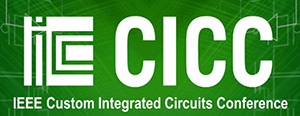Call for Papers Overview
IEEE CICC Call for Papers
Contact the Conference Manager, John Teehan (), with questions.
IEEE CICC Call for Papers
Extended Submission Deadline is 11:59 pm PT on November 15, 2019
IEEE Custom Integrated Circuits Conference (CICC)
is sponsored by the IEEE Solid-State Circuits Society
and technically co-sponsored by the IEEE Electron Devices Society
Mar 22 – Mar 25, 2020 at Hyatt Boston Harbor, Boston, MA
Submission of original unpublished work in following areas:
Analog Circuits and Techniques for areas such as communications, biomedical, aerospace, automotive, energy, environment, analog computing and security applications, ranging from building blocks to silicon sensors, interfaces, and novel clock generation architectures.
Data Converters including but not limited to A/D, D/A, time-to-digital, frequency-to-digital and analog to information converters of all types enabled by new techniques, architectures, or technologies.
Design Foundations for novel digital, analog, mixed-signal, and memory circuit techniques for present and emerging applications (deep learning, autonomous vehicles, IoT, security, quantum computing). Modeling and simulation of advanced CMOS (FinFET, UTTB-SOI) and beyond-CMOS devices (MEMS, GaN, Non-Volatile Memories, STT) to improve design quality, efficiency, and reliability. Design for manufacturing, test, aging, security, and reliability (novel DFT circuits, system-level testing). High-level system modeling, digital/analog design infrastructure, and verification and emulation for complex SoCs.
Digital Circuits, SoCs, and Systems solicit hardware-based papers in technologies that enhance integrated systems including processors, accelerators, memory systems, with applications in artificial intelligence, security, autonomous transportation, cloud computing, sensing, and communication.
Emerging Technologies, Systems, and Applications solicit hardware focused papers in the technologies of tomorrow extending from new device to system integration and applications with focus on, but not limited to:
- Next-generation technology and sensors including devices, integration, and packaging including nano-primitives, non-silicon based technology, and advanced assembly. Sensor interfaces for MEMS, mm-wave/THz, flexible, printed, large-area and organic electronics, electronic-photonic co-design, and silicon photonics.
- Biomedical circuits, systems, and applications including neural interfaces, microarrays, lab-on-a-chip, bio-inspired circuits, implantable and/or wearable systems, closed-loop systems with sensing and actuation, medical imaging, and other biosensors including biomedical signal processing SoCs.
Power Management circuits and design techniques including DCDC converters, control and management circuits, linear regulators, wireless power transfer, and other methods for improvements in overall system efficiency and performance.
Wireless Transceivers and RF/mm-Wave Circuits and Systems for low-power, energy-efficient and high performance wireless links, biomedical and sensing networks, IoT applications, cellular connectivity including M2M applications (LTE-M, NB-IoT), emerging broadband and MIMO networks (5G, WLAN), vehicle-to-vehicle (V2V), millimeter-wave & THz systems (radar, sensing and imaging), frequency synthesis and LO generation.
Wireline and Optical Communications Circuits and Systems for electrical and optical communications, including serial links for intra-chip and chip-to-chip interconnections, high-speed memory and graphics interfaces, backplanes, long-haul, and power line communications; novel I/O circuits for advancing data rates, improving power efficiency, and supporting extended voltage applications; clocking techniques including PLLs and CDRs; components such as equalizers, high-speed ADC-RX/DAC-TX, silicon photonic and optical interface circuitry.
Conference Technical Sessions and Events
Technical Sessions addressing a broad range of circuits, applications, design techniques, tools, test, reliability, and emerging technologies, and providing education on new, state-of-the-art developments is the core of the CICC technical program.
Educational Sessions instructed by recognized invited speakers who are among the best in the industry are included in the conference. They are valuable opportunities to refresh key skills in traditional circuit-design methods and acquire knowledge in vital new areas in analog, digital, and RF integrated circuit design.
Panels, Forums and a Plenary Session provide a platform for leaders from the IC industry and academia to present highlights on new field of research and development related to circuit design and to debate key issues and controversial topics. CICC panels are well known for their lively and thought-provoking discussion and audience participation.
Our Welcome Reception, Conference Luncheon and Exhibit with food and beverage, provide additional opportunities for discussion and peer networking.
Paper Submission
Four-page-long papers should be final format ready for publishing and submitted electronically in PDF format using the CICC website (www.ieee-cicc.org). CICC follows a double-blind review process. Please refer to the instructions on the submission website. Appropriate company and government clearances MUST be obtained prior to submission. Papers must report an original unpublished work and concisely explain how the state-of-the-art is advanced. Circuit-design papers must include measured experimental results that substantiate performance claims. Deadline for paper submission is 11:59 pm Pacific Time on November 15, 2019. Submitting authors will be notified of the final decision by January 20, 2020. Top-rated papers will be invited to a special issue at IEEE Journal of Solid-State Circuits.
For more information, please visit www.ieee-cicc.org.
General Chair
Hua Wang, Georgia Institute of Tech:
Conference Chair
Foster Dai, Auburn University:
Technical Program Chairs
Christophe Antoine, Analog Devices:
Samuel Palermo, Texas A&M University:
Conference Technical Sessions and Events
Technical Sessions addressing a broad range of circuits, applications, design techniques, tools, test, reliability, and emerging technologies, and providing education on new, state-of-the-art developments is the core of the CICC technical program.
Educational Sessions instructed by recognized invited speakers who are among the best in the industry are included in the conference. They are valuable opportunities to refresh key skills in traditional circuit-design methods and acquire knowledge in vital new areas in analog, digital, and RF integrated circuit design.
Panels, Forums and a Plenary Session provide a platform for leaders from the IC industry and academia to present highlights on new field of research and development related to circuit design and to debate key issues and controversial topics. CICC panels are well known for their lively and thought-provoking discussion and audience participation.
Our Exhibit, is where semiconductor manufacturers, IP providers, SW tool suppliers, design-service houses, and technical book publishers offer of their products. Our Welcome Reception, Conference Luncheon and Exhibit with food and beverage, provide additional opportunities for discussion and peer networking.
General Chair
Hua Wang, Georgia Institute of Tech:
Conference Chair
Foster Dai, Auburn University:
Technical Program Chairs
